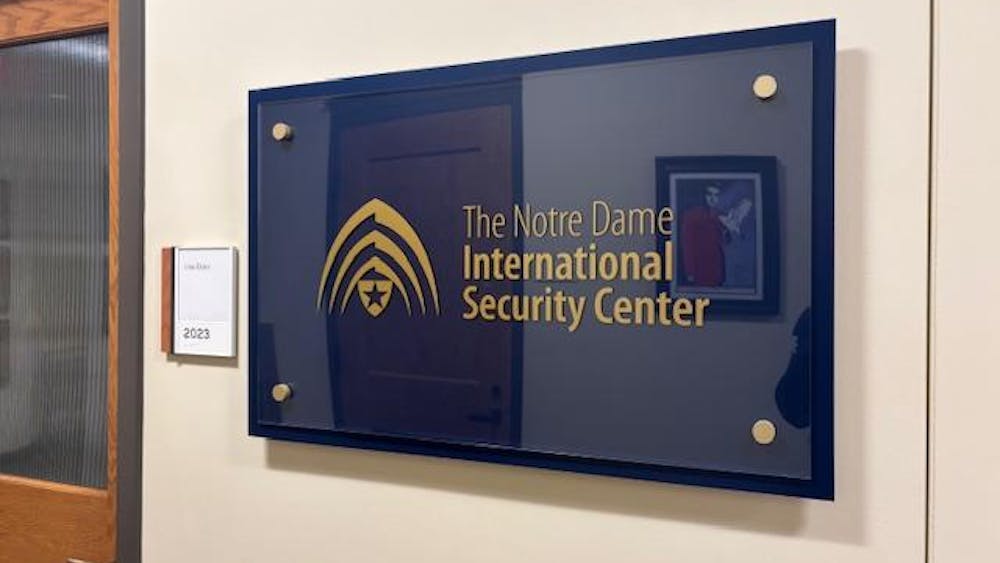As members of the class of 2019 receive their diplomas and complete their undergraduate careers, their eyes turn toward beginning their lives after college. For some, this beginning takes the form of employment, others in the form of further graduate education and some will begin their post-graduate lives doing service.
According to the University‘s “First Destination” statistics for the Class of 2018, 65% of Notre Dame graduates are expected to be employed within six months of graduation. Ryan Willerton, Notre Dame’s associate vice president for career and professional development, said the University expects consulting, financial services and technology to be the most popular industries for Notre Dame graduates. Willerton also said many of the class of 2019’s first jobs will be steppingstones for the rest of their careers.
“For many of them, it’s a first destination; it’s a first stop for a student who might pursue this for two or three years and then realize, ‘I’ve got a great education as a foundation, I have an opportunity to learn these skills and network, get into the Notre Dame alumni network as well, and then be able to leverage that for a career pivot,’” he said. “That’s really what we’re trying to do here in the [Center for Career Development] — give students the tools so they understand how to utilize these resources for the rest of their life. It’s not just about getting a first job or getting into grad school — these are the tools that you need, these are the skills you need to develop and the competencies you need to gain, so you can pivot and you can advance your career from there.”
Senior David Scaramucci, a management consulting and Peace Studies double-major, said he credits the Center for Career Development with providing him the infrastructure necessary for landing a job in consulting prior to his graduation.
“I knew I wanted to go into consulting and they just have everybody there — it was an easy middleman to help me as a student to connect with the employer,” he said.
While about two thirds of the senior class will enter the workforce, 22% of the Class of 2018 pursued graduate degrees, according to the First Destination survey.
Senior Evan Nichols, a biology major and Constitutional Studies minor who will be pursuing a PhD in biology at Stanford University in the fall, said his experience performing research as an undergrad was an impetus for his decision to pursue a graduate degree.
“I’ve been working with a professor on campus doing research for three years now, and I kind of got the bug for research and being able to ask questions and answer questions, I really then set my career path because these are the things I’d like to continue to do,” Nichols said. “ … Going to graduate school and getting a PhD is the first step on that process, so I’m really excited to do it.”
If recent trends in Notre Dame graduates continue, approximately 7% of graduates will pursue service directly out of college, Willerton said. This number is almost 10 times larger than the national average for college graduates.
“Notre Dame’s service number is much higher than many other colleges and universities, and that’s one of the things that makes Notre Dame distinct,” he said.
Notre Dame’s placement rate — or the percentage of alumni with post-graduate plans — of graduates six months after they receive their diploma hovers around 98%. Willerton said this high rate is a result of the way Notre Dame educates students for real world success.
“You need to make sure you’re developing not only the leadership skills but also the interpersonal skills,” Willerton said. “When we talk to our employers, we hear over and over that Notre Dame students excel in their interpersonal relationships. The ability to work as a team, those are core skills that students are going to need and its one of the reasons Notre Dame graduates are finding their way into managerial and leadership positions more than other universities because they have these skills.”
Scaramucci said his academic track at Notre Dame has prepared him with those interpersonal skills as well as a critical perspective of his surroundings.
“I think sometimes you’re in class and you’re like, ‘I don’t understand how this relates to outside life,’ but I think my management consulting major was so much group projects and presentations that I’m so comfortable doing that now and that’s a lot of what consulting is,” Scaramucci said. “From the Peace Studies perspective, you see how complex problems can be and how sometimes well-intentioned proposals sometimes have negative consequences and how you should be aware of those and how you should critique them when they arise.”
This process of developing leadership skills in and outside the classroom, Willerton said, begins with the University’s unique residential system.
“It starts in our residence halls,” he said. “The residential tradition and what we have here where you’re starting off as a freshman living with seniors and you’re seeing that modeled behavior where they understand that college is more than just going to class and relaxing and playing sports and going to games, it’s really about figuring out who you are as a person and how you translate that into the rest of your life.”
Nichols said his time at Notre Dame has helped him expand his academic horizons beyond his immediate interests.
“I’ve really gained an appreciation for having a holistic intellectual life. Not being able to just focus on a single discipline like biology, but also being able to think about some of the bigger questions,” he said.
“ … I think a lot of disciplines are all trying to answer similar questions when you really zoom out and get the big picture view. So, I think being able to appreciate other people’s approaches to things and being able to digest them is what I’ll be able to carry out of Notre Dame.”
Read More
Trending









